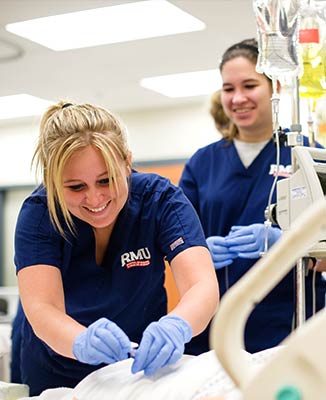Secondary Education B.S. (Biology)
The B.S. in Secondary Education with a concentration in Biology Education prepares students for rewarding middle school or high school teaching positions in the biological/life sciences. Students complete studies in biology and chemistry and a set of core experiences in professional education, including participation in guided fieldwork. Graduates of the program are qualified to apply for state certification to teach biology in grades 7-12 in Pennsylvania.
Contact Information
Susan Parker, Ph.D.
Department Head, Education
Professor, Education
parkers@rmu.edu
412-397-6245
- 4-Year Course Plan
-
Freshman Year, Fall
- CHEM1210 Chemistry I
- CHEM1215 Chemistry I Lab
- EDUC2000 Schools and Society
- FYSP 1000 First Year Experience
- Core: BIOL1310 Principles of Biology I
- Core: BIOL1315 Principles of Biology I Lab
- Core: CSEN1020 Argument and Research
- Core: ELIT1040 Reading Literature: Coming of Age
Freshman Year, Spring
- BIOL2310 Principles of Biology II
- BIOL2315 Principles of Biology II Lab
- CHEM2210 Chemistry II
- CHEM2215 Chemistry II Lab
- EDUC2100 Educational Psychology & Classroom Management
- Core: MATH2070: Calculus with Analytic Geometry I
- Core: PSYC1010: General Psychology
Sophomore Year, Fall
- BIOL2370 Microbiology
- BIOL2380 Microbiology Lab
- BIOL2470 Botany
- BIOL2480 Botany Lab
- ENVS2500 Ecology
- ENVS2550 Ecology Lab
- Core: CSCM1030 Public Speaking & Persuasion
Sophomore Year, Spring
- EDUC2200 Technology for Teachers
- BIOL3370 Cell/Molecular Biology
- BIOL3375 Cell/Molecular Biology Lab
- BIOL2570 Zoology
- BIOL2580 Zoology Lab
- STAT2110 Statistics
- Core: CSEN1010 OR CSSCM2050
Junior Year, Fall
- EDUC3400 Curriculum Instruction Design
- BIOL3470 Human Genetics
- BIOL3475 Human Genetics Lab
- BIOL3570 Comparative Vertebrate Anatomy
- BIOL3580 Comparative Vertebrate Anatomy Lab
Or - BIOL3110 Advanced Human Anatomy
- BIOL3115 Advanced Human Anatomy Lab
- SPED3010 Intro. to Special Ed. PreK-12
- Core: CSCM2040 Prof. Comm. in the Workforce
Junior Year, Spring
- EDUC3600 Educational Assessment
- BIOL3670 Comparative Vertebrate Physiology
- BIOL3660 Comparative Vertebrate Physiology Lab
- PHYS1010 Physics for Allied Health
- PHYS1015 Physics for Allied Health Lab
Or - PHYS1210 General Physics 1
- PHYS1215 General Physics 1 Lab
- SPED3020* Teaching in Inclusive Classrooms PreK-12
Senior Year, Fall
- EDUC3165 Teaching English Language Learners
- EDUC4140 Content Specific Pedagogy: Biology (with Co-requisite EDUC0440 Pre-Student Teaching - 0 credits)
- Core: HUMA1010 Humanities: Arts & Music
- Core: SOCI Requirement
- Core: HIST or POLS Requirement
- EDUC0105 Praxis Prep Biology
- SPED3050 Teaching Students with Higher Incidence Disabilities
- Elective Recommended
Senior Year, Spring
- EDUC4200 Student Teaching Seminar
- EDUC4540 Student Teaching Internship: Biology
- Admission Requirements
-
To receive acceptance to Robert Morris University's education programs, students must meet one of the following sets of academic criteria listed here:
Additional admission requirements for RMU education programs are available on this page.
Sample Courses:
These are some of the classes for students in this academic program:
Top Employers

Call us at:
1-800-762-0097
School of Nursing, Education and Human Studies
More than ever before, today’s complex healthcare environment needs skilled clinicians, expert communicators, and good people. Our students are about more than a major.
Visit School Site
